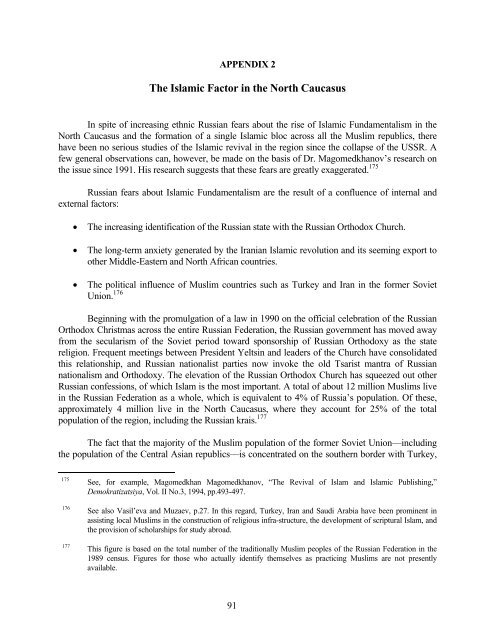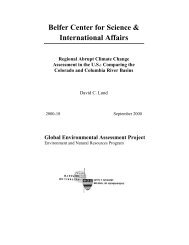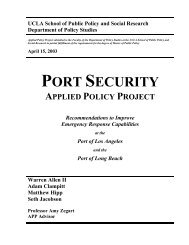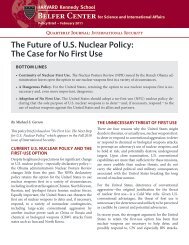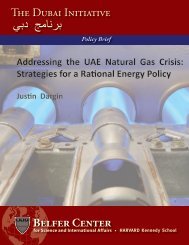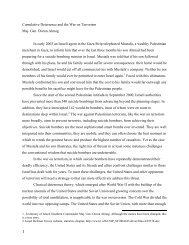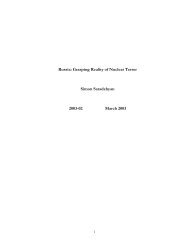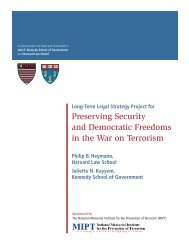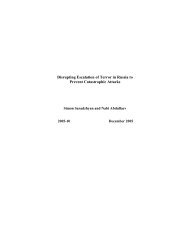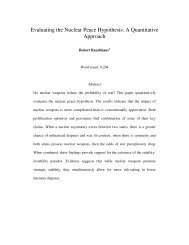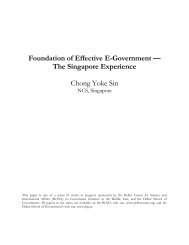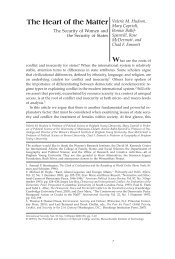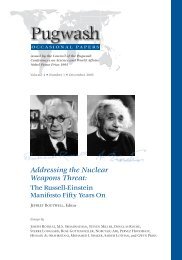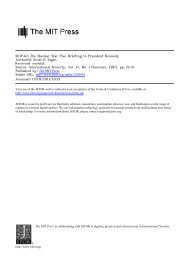RUSSIA'S TINDERBOX - Belfer Center for Science and International ...
RUSSIA'S TINDERBOX - Belfer Center for Science and International ...
RUSSIA'S TINDERBOX - Belfer Center for Science and International ...
You also want an ePaper? Increase the reach of your titles
YUMPU automatically turns print PDFs into web optimized ePapers that Google loves.
APPENDIX 2<br />
The Islamic Factor in the North Caucasus<br />
In spite of increasing ethnic Russian fears about the rise of Islamic Fundamentalism in the<br />
North Caucasus <strong>and</strong> the <strong>for</strong>mation of a single Islamic bloc across all the Muslim republics, there<br />
have been no serious studies of the Islamic revival in the region since the collapse of the USSR. A<br />
few general observations can, however, be made on the basis of Dr. Magomedkhanov’s research on<br />
the issue since 1991. His research suggests that these fears are greatly exaggerated. 175<br />
Russian fears about Islamic Fundamentalism are the result of a confluence of internal <strong>and</strong><br />
external factors:<br />
• The increasing identification of the Russian state with the Russian Orthodox Church.<br />
• The long-term anxiety generated by the Iranian Islamic revolution <strong>and</strong> its seeming export to<br />
other Middle-Eastern <strong>and</strong> North African countries.<br />
• The political influence of Muslim countries such as Turkey <strong>and</strong> Iran in the <strong>for</strong>mer Soviet<br />
Union. 176<br />
Beginning with the promulgation of a law in 1990 on the official celebration of the Russian<br />
Orthodox Christmas across the entire Russian Federation, the Russian government has moved away<br />
from the secularism of the Soviet period toward sponsorship of Russian Orthodoxy as the state<br />
religion. Frequent meetings between President Yeltsin <strong>and</strong> leaders of the Church have consolidated<br />
this relationship, <strong>and</strong> Russian nationalist parties now invoke the old Tsarist mantra of Russian<br />
nationalism <strong>and</strong> Orthodoxy. The elevation of the Russian Orthodox Church has squeezed out other<br />
Russian confessions, of which Islam is the most important. A total of about 12 million Muslims live<br />
in the Russian Federation as a whole, which is equivalent to 4% of Russia’s population. Of these,<br />
approximately 4 million live in the North Caucasus, where they account <strong>for</strong> 25% of the total<br />
population of the region, including the Russian krais. 177<br />
The fact that the majority of the Muslim population of the <strong>for</strong>mer Soviet Union––including<br />
the population of the Central Asian republics––is concentrated on the southern border with Turkey,<br />
175 See, <strong>for</strong> example, Magomedkhan Magomedkhanov, “The Revival of Islam <strong>and</strong> Islamic Publishing,”<br />
Demokratizatsiya, Vol. II No.3, 1994, pp.493-497.<br />
176 See also Vasil’eva <strong>and</strong> Muzaev, p.27. In this regard, Turkey, Iran <strong>and</strong> Saudi Arabia have been prominent in<br />
assisting local Muslims in the construction of religious infra-structure, the development of scriptural Islam, <strong>and</strong><br />
the provision of scholarships <strong>for</strong> study abroad.<br />
177 This figure is based on the total number of the traditionally Muslim peoples of the Russian Federation in the<br />
1989 census. Figures <strong>for</strong> those who actually identify themselves as practicing Muslims are not presently<br />
available.<br />
91


